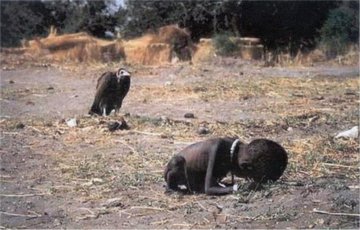Faith and Failure
She weeps on through the night, and her tears are on her cheek. Lamentations 1:2 Robert Alter
Weeps on – “If faith is to become real, catastrophe must be acknowledged and fully spoken.”[1]
Perhaps you need to read that Zornberg statement again. Slowly. If you want a real faith, faith that matters, that has grit, then you will have to cry your way through this world. The faithful know all too well this vale of tears we call home.
We could be stoic about it. After all, everyone dies. But death isn’t really the problem, is it? Death is the final solution to the problem. The real problem is living—living in a world so filled with sorrow, heartache, remorse, regret, and, yes, horror. A pleasant death isn’t available for most of us. Most of us die in unspeakably horrible ways. When we even see this, when we observe the tragic inexplicability of life, we turn away. It’s just too much.
It was too much for Kevin Carter, the prize-winning photographer who portrayed the desperation of the world’s poor in a picture that won’t be forgotten. A Sudanese girl dies from starvation while the vulture watches his next prey. Carter could never forget—and he committed suicide. The horror was just too much to even witness.

I have a “Kevin Carter” photo, a picture I took in the Shanghai subway. I can’t forget all the people who looked the other way as they passed by the man whose face and fingers had been burned off. Waiting . . . waiting . . . for someone to care. “Don’t put much money in his can,” I was told. “The thieves will come to steal it and beat him.” Crying for not dying. That is the reality for the wretched of us who survive on this earth. Perhaps they are better off dead.

Does the Bible have any answers for the blood, sweat, and tears? Consider Lamentations. Perhaps you’ve never read this dour book. Perhaps you should. It’s filled with tears—and terrors. Starvation, genocide, torture, and loads of suffering. Like most of our world. We, the Western occupants of a capitalism bubble, have avoided most of what the world knows as daily reality. I’ve mentioned before that the 25 richest people in the world have more financial wealth than 3.8 billion of the poor. Proverbs is right; wealth shields us from some of life’s catastrophes. Sometimes. But things can still all fall apart. What does Lamentations say about those times when God seems to let the demons loose among us?
“Beyond what can be said, or known, there is an opening to the infinite.”[1] I don’t know why God blessed me with where and when I was born. I don’t know why the little girl in the Sudan starved to death or the man in Shanghai was burned. I can’t imagine a life like that. Even thinking about it brings inconsolable heart shudders. The only thing I know is that He has given me an opportunity to feel His heart in these slices of pitiful humanity—and asked me to do something about it. I don’t choose suicide because I believe there is a God who cares. I believe there is a God who cares because the alternative is unthinkable—and life terminating. I’m not Mother Teresa. I probably can’t sit in the ditch on the side of the road and hold a leper in my arms. But maybe that tells me more about my fragility—and fear—than it does about the leper. God is in this somewhere, but I am sure I will have to cry a lot more before I can catch up with Him.
Topical Index: suffering, death, tears, Lamentations 1:2
[1] Avivah Gottlieb Zornberg, Bewilderments: Reflections on the Book of Numbers, pp. xxii-xxiii.
[1] Ibid., p. xxiii.




Skip, It’s true that you are no Mother Teresa. In truth, even Mother Teresa, as portrayed by the Catholic Church, was no Mother Teresa. She struggled with what she termed “the excruciating night in her soul” and her “spiritual dryness.” One cannot help but wonder if her doubts were not birthed from coming alongside so much suffering, misery, poverty and pain and having her prayers for healing and relief go unanswered. She wrote “So many unanswered questions live within me afraid to uncover them–because of the blasphemy–If there be God –please forgive me–When I try to raise my thoughts to Heaven–there is such convicting emptiness that those very thoughts return like sharp knives & hurt my very soul.–I am told God loves me–and yet the reality of darkness & coldness & emptiness is so great that nothing touches my soul.”
We all suffer in this life, some much more than ourselves; but we are called not just to be witnesses to their suffering, but to offer to them some of the abundance with which we have been blessed. Yeshua and Torah commanded us to help the widow, orphan and the stranger among us and in a global community every one is our neighbor and we their near kinsman.
Your good works will not go unrewarded, nor will they go unnoticed as all The Children Under the Bridge will loudly shout before the Throne of your compassion and hesed towards them. And your 40 years of writing bears witness and fruit for the Kingdom as well. I am from that fruitful and faithful vine and I am grateful.
ditto